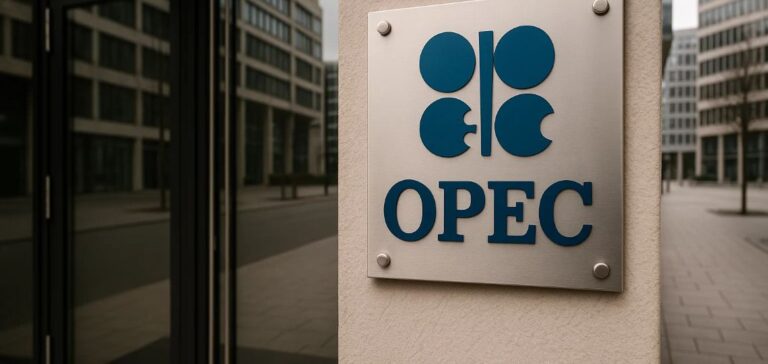The International Energy Agency (IEA) anticipates a significant rise in global oil inventories starting next year, driven directly by declining demand in developed economies and increased production by the Organization of the Petroleum Exporting Countries and its allies (OPEC+). According to the latest forecasts, this dynamic will lead to a notable “rebalancing” between supply and demand following an extended period of tightness in the oil markets. The IEA maintains its forecast for global demand growth at 740,000 barrels per day (b/d) for 2025, slightly adjusting upwards its estimates for 2026, projecting growth of 760,000 b/d. However, this apparent stability masks significant divergence between emerging and developed economies.
Declining Demand in OECD Countries
In the countries of the Organisation for Economic Co-operation and Development (OECD), oil demand is expected to fall by 120,000 b/d in 2025, accelerating to 240,000 b/d in 2026. This trend is primarily attributed to an uncertain economic climate, notably linked to persistent international trade tensions. Despite some improvement in trade relations between the United States and China, economic uncertainties continue to negatively impact overall oil demand. Moreover, recent low oil prices and a weaker US dollar could modestly boost consumption in some regions, although this effect remains limited due to state-controlled pricing mechanisms in several emerging markets.
Upward Revisions for Egypt and Nigeria
The IEA revised historical and future oil consumption data upwards for Egypt and Nigeria following corrections to national statistics. For Egypt, new data indicates higher consumption of fuel oil, diesel, and liquefied petroleum gas (LPG) than initially reported, primarily due to increased use of oil for power generation amid natural gas shortages. In Nigeria, revised data reveals a marked acceleration in fuel consumption, particularly gasoline and diesel, partly driven by the commissioning of new refining capacities, such as the Dangote refinery.
OPEC+ Raises Production, Russia Impacted
On the supply side, the OPEC+ decision to accelerate production increases from 2025 should boost global oil supply by 1.6 million b/d, according to IEA estimates. Saudi Arabia is expected to account for the majority of this increase, offsetting the underproduction of some group members that have failed to meet their quotas. Conversely, oil supply prospects outside of OPEC+ remain mixed, with growth of 1.3 million b/d expected in 2025 but revised downward to 820,000 b/d in 2026, partly due to difficulties facing US shale oil producers.
Russia is directly affected by recent declines in oil prices, impacting its oil export revenues despite an increase in its export volumes to 7.6 million b/d in April. Russian oil revenues thus fell to their lowest level since June 2023, reaching approximately $13.2 billion for April. Meanwhile, intensified sanctions targeting Russia’s maritime fleet have further complicated the country’s situation, despite the easing of certain restrictions related to the price cap on Russian oil.
OPEC Adjusts Its Own Forecasts
In its monthly report, OPEC also revised downward its growth forecasts for oil supply from non-OPEC+ countries, expecting limited growth of 800,000 b/d for 2025 and 2026. This figure, lower than the IEA’s estimates, reflects an anticipated 5% reduction in exploration and production expenditures outside OPEC+. Additionally, OPEC slightly raised its estimate of the volume of crude oil the group must produce to balance the global market to approximately 42.6 million b/d in 2025 and 42.9 million b/d in 2026.
These developments highlight persistent economic uncertainties influenced by international trade policies and operational constraints faced by producers, leaving sector professionals to consider the potential evolution of the global oil market.






















